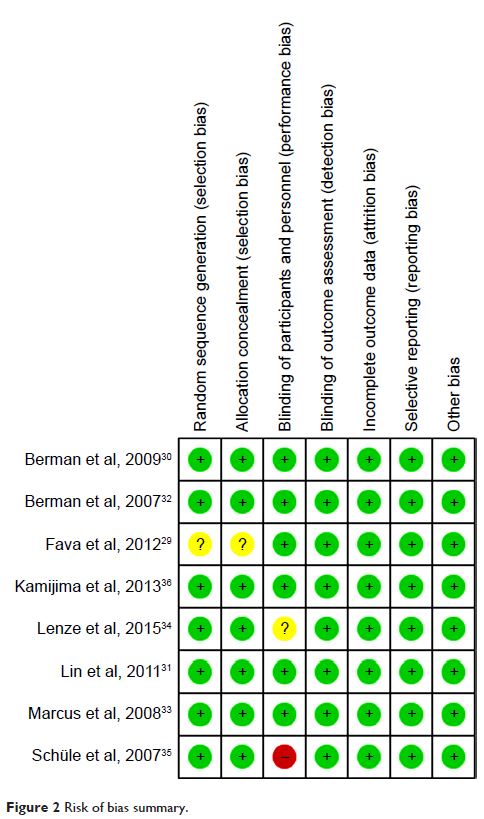108985
论文已发表
注册即可获取德孚的最新动态
IF 收录期刊
- 3.4 Breast Cancer (Dove Med Press)
- 3.2 Clin Epidemiol
- 2.6 Cancer Manag Res
- 2.9 Infect Drug Resist
- 3.7 Clin Interv Aging
- 5.1 Drug Des Dev Ther
- 3.1 Int J Chronic Obstr
- 6.6 Int J Nanomed
- 2.6 Int J Women's Health
- 2.9 Neuropsych Dis Treat
- 2.8 OncoTargets Ther
- 2.0 Patient Prefer Adher
- 2.2 Ther Clin Risk Manag
- 2.5 J Pain Res
- 3.0 Diabet Metab Synd Ob
- 3.2 Psychol Res Behav Ma
- 3.4 Nat Sci Sleep
- 1.8 Pharmgenomics Pers Med
- 2.0 Risk Manag Healthc Policy
- 4.1 J Inflamm Res
- 2.0 Int J Gen Med
- 3.4 J Hepatocell Carcinoma
- 3.0 J Asthma Allergy
- 2.2 Clin Cosmet Investig Dermatol
- 2.4 J Multidiscip Healthc

辅助性阿立哌唑在难治性抑郁症治疗中的疗效、可接受性和安全性:对随机对照试验的一项综合分析
Authors Luan SX, Wan HQ, Zhang L, Zhao H
Received 9 November 2017
Accepted for publication 12 December 2017
Published 8 February 2018 Volume 2018:14 Pages 467—477
DOI https://doi.org/10.2147/NDT.S156619
Checked for plagiarism Yes
Review by Single-blind
Peer reviewers approved by Prof. Dr. Roumen Kirov
Peer reviewer comments 2
Editor who approved publication: Professor Wai Kwong Tang
Background: Treatment-resistant depression (TRD) is common and potentially
life-threatening in adults, and the benefits and risks of adjunctive
aripiprazole in these patients remain controversial. Therefore, we conducted a
meta-analysis of randomized controlled trials (RCTs) to assess the efficacy,
acceptability, safety, and quality of life of adjunctive aripiprazole in
patients with TRD.
Methods: RCTs published in PubMed, Web of Science, and Embase were systematically
reviewed to evaluate the efficacy and safety profiles of TRD patients who were
treated with adjunctive aripiprazole. The main outcome measures included
response rate, remission rate, changes from baseline in Montgomery–Asberg
Depression Rating Scale (MADRS), Clinical Global Impression-severity (CGI-S),
Clinical Global Impression-improvement (CGI-I), 17-Item Hamilton Rating Scale
for Depression (HAM-D17), Sheehan Disability scale (SDS), and Inventory of
Depressive Symptomatology Self-Report Scale (IDS-SR), discontinuation due to
adverse events, and adverse events. Risk ratio (RR) or weight mean difference
with 95% confidence intervals (CIs) were pooled using a fixed-effects or
random-effects model according to the heterogeneity among studies.
Results: A total of 8 RCTs involving 2,260 patients were included in this
meta-analysis. Adjunctive aripiprazole was associated with a significantly
higher remission rate (RR =1.64, 95% CI: 1.42 to 1.89; P <0.001) and response rate (RR
=1.45, 95% CI: 1.13 to 1.87; P =0.004) than other
treatments. Moreover, adjunctive aripiprazole had greater changes in MADRS
score, CGI-S score, CGI-I score, HAM-D17 score, SDS score, and IDS-SR score.
There were more patients treated with adjunctive aripiprazole who discontinued
their treatments due to adverse events. The incidence of adverse events was
significantly higher in the adjunctive aripiprazole group than in other treatment
groups.
Conclusion: The adjunctive aripiprazole showed benefits in improving the response
rate, remission rate, and the quality of life in patients with TRD. However,
clinicians should interpret these findings with caution due to the evidence of
potential treatment-related side effects.
Keywords: treatment-resistant depression, adjunctive aripiprazole,
meta-analysis
